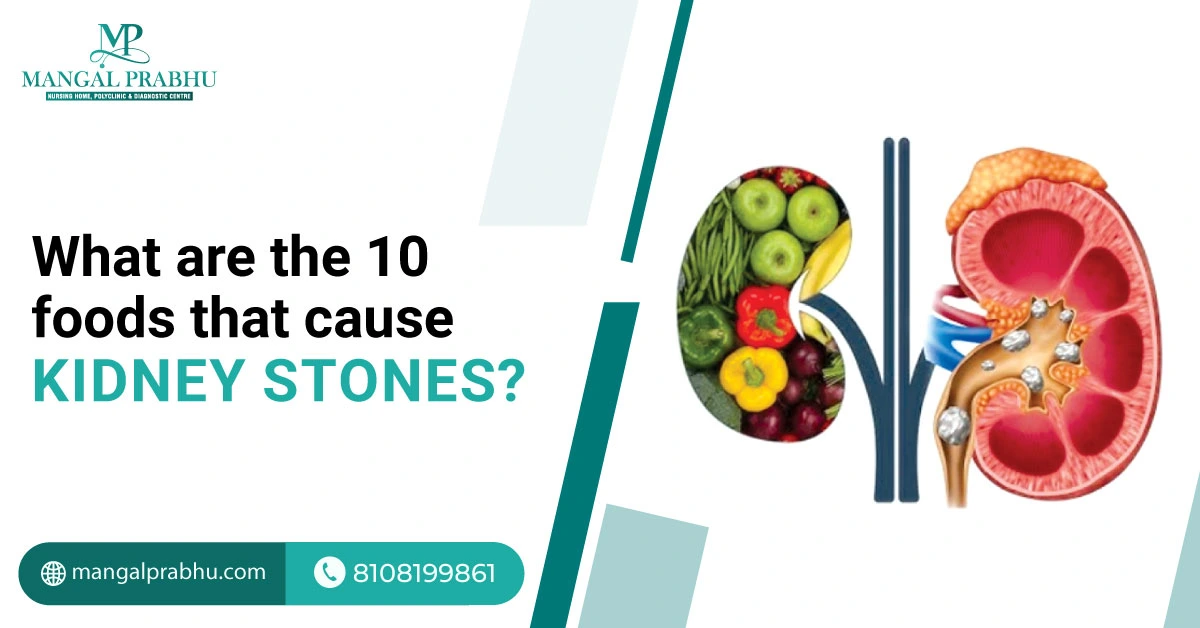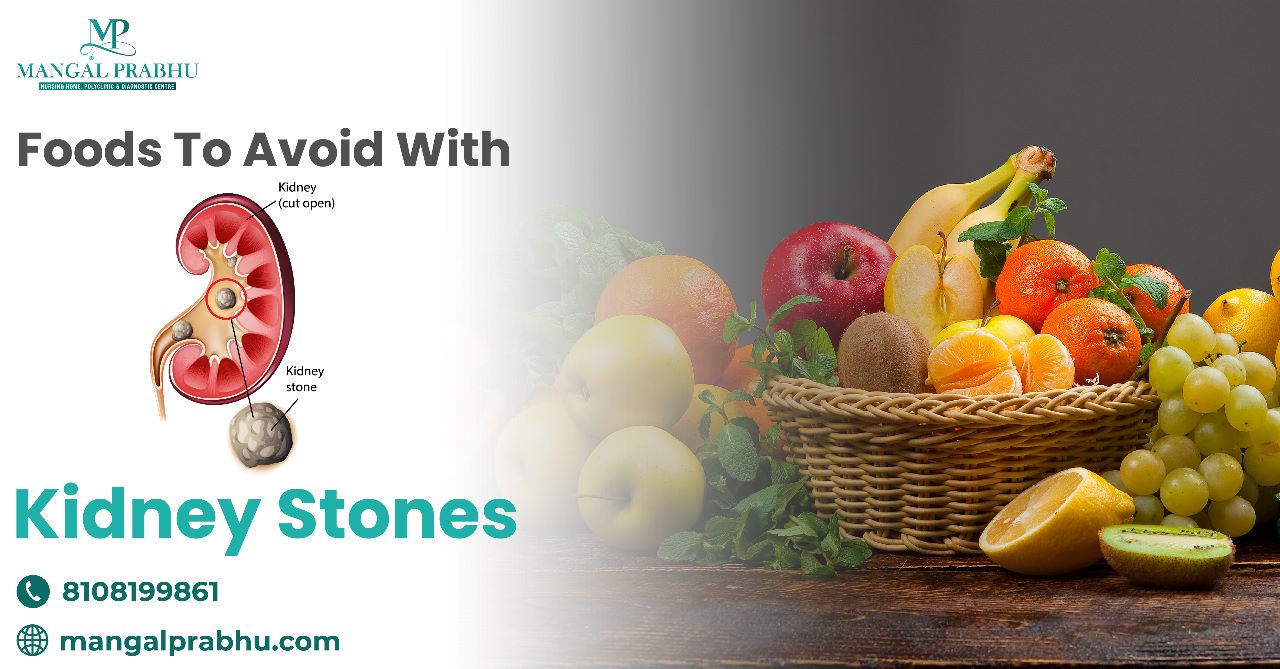
What are the 10 Foods that Cause Kidney Stones?
Kidney stones are hard mineral deposits that form in the kidneys and can pass through the urinary tract. Smaller kidney stones might go unnoticed, as they can pass through urine. Larger kidney stones can get stuck in the ureters and other parts of the urinary tract, blocking urine and causing immense pain. This requires kidney stone treatment in Navi Mumbai. Many factors contribute to the heightened risk of developing kidney stones, but unhealthy food choices are often the most common culprit.
10 Foods That Cause Kidney Stones
Here are the top 10 foods you should avoid to prevent kidney stones.
1) High-Oxalate Foods:
Calcium-oxalate stones form when you eat a diet rich in oxalates with a low intake of calcium. It’s best to eat oxalate-rich foods, such as spinach, beets, nuts, and chocolates, in moderation or combine them with calcium-rich food.
2) Excessive Sodium:
Too much sodium in your diet can lead to a high concentration of calcium in your urine, which can cause kidney stones. Limit your sodium consumption to less than 2,300 mg per day. Avoid packaged foods, canned soups, and junk food.
3) Animal Proteins:
Red meat and organ meats can raise uric acid levels while reducing citrate, increasing your risk of developing kidney stones. Replace them with plant-based proteins.
4) Sugary Foods/Drinks:
Like sodium, sweetened beverages can increase calcium in the urine and may disrupt urinary composition. Avoid too many candies, pastries, desserts, and sweetened drinks.
5) Dairy Products:
Although calcium from dairy products like milk and cheese is healthy, overconsumption of calcium-rich foods or calcium supplements can cause calcium oxalate stones. Eat dairy products in moderation (1200 mg daily) and drink enough water.
6) Caffeine:
Caffeine in moderation is safe, but excessive intake can cause dehydration, which can increase the risk of kidney stones. To stay hydrated, limit your tea and coffee intake to 1-2 cups a day and drink water instead.
7) Alcohol:
By reducing your urine output and causing dehydration, alcohol can increase your risk of developing kidney stones. Quit alcohol and switch to healthier drinks instead.
8) Purine-rich foods:
A purine-rich diet can increase uric acid levels in the body, leading to uric acid or calcium stones. Sardines, shellfish, and organ meats are some examples of purine-rich foods.
9) Processed Foods:
Kidney stone specialists in Navi Mumbai advise people to steer clear of processed foods like frozen meals, instant noodles, and all types of packaged items. That’s because these foods contain a considerable amount of sodium and preservatives, which might increase calcium excretion in urine, causing kidney stones.
10) Supplements Overuse:
Excessive calcium, especially if it comes from supplements, combined with overuse of vitamin C and protein supplements, can cause kidney stone formation. Sticking to natural, whole, and unprocessed foods is best. Supplements should only be used when recommended by a healthcare specialist.
Conclusion
Your dietary choices can cause kidney stone formation. This is particularly true for people who eat calcium-rich, oxalate-rich, purine-rich, and sodium-rich foods. Anything that affects the urinary composition can increase your risk of kidney stone formation.

How Stones Are Formed In Kidney?
Kidney stones, scientifically known as nephrolithiasis, are a common and painful urological condition. These small, solid, crystalline masses can form in the kidneys, causing immense discomfort and sometimes requiring medical intervention.
Let’s explore the formation of kidney stones, their causes, symptoms, and available treatment options. Here, you can also learn about the preventive measures, and the importance of seeking specialized care, such as Kidney Stone Treatment in Navi Mumbai at a leading healthcare facility for urological concerns.
What is a Kidney Stone?
Kidney stones are hard deposits in the kidneys when certain minerals and salts in the urine bind together. These stones can vary in size, from tiny particles resembling grains of sand to larger, more noticeable masses. Kidney stones can be composed of different substances, with calcium oxalate being the most common.
Causes of Kidney Stones
Understanding the formation of kidney stones begins with recognizing the factors that contribute to their development:
- A diet high in oxalate-rich foods like spinach, beets, nuts, and chocolate can increase the risk of kidney stone formation. Excessive consumption of sodium and animal protein can also be culprits.
- Inadequate fluid intake can lead to concentrated urine, making it easier for minerals to crystallize and form stones.
- Certain conditions like hyperparathyroidism and urinary tract infections can promote stone formation.
- Some medications, such as diuretics and antacids containing calcium, may contribute to kidney stone development.
Symptoms of Kidney Stones
The presence of kidney stones can result in a range of symptoms, including:
- Painful urination.
- Frequent urination in small amounts.
- Blood in the urine.
- Nausea and vomiting.
- Fever and chills.
- Severe pain in the back or side, often radiating to the lower abdomen and groin.
Also Read: Foods To Avoid With Kidney Stones
Treatment Options for Kidney Stones
When addressing kidney stones, prompt and appropriate treatment is essential. Kidney stone treatment at Mangal Prabhu Hospital in Navi Mumbai is offered by specialists who employ advanced techniques to manage this condition effectively.
a) Medication
Medication to relieve pain and facilitate stone passage may be prescribed for smaller stones that can be passed naturally.
b) Extracorporeal Shock Wave Lithotripsy
This non-invasive procedure uses shock waves to break down stones into smaller pieces, making them easier to pass.
c) Ureteroscopy
A thin tube with a camera is inserted into the urinary tract to locate and remove or break up stones.
Prevention of Kidney Stones
Taking steps to prevent kidney stones is crucial, especially if you have a history of stone formation or are at risk due to dietary choices or medical conditions:
- Stay well-hydrated by drinking plenty of water throughout the day to dilute urine and prevent mineral buildup.
- Limit high-oxalate foods, sodium, and animal protein consumption. Increase your intake of citrate-rich foods like citrus fruits.
- If you have a history of kidney stones, regular check-ups with a kidney stone specialist in Navi Mumbai can help monitor your condition and make necessary adjustments to your treatment plan.
Conclusion
Kidney stones are a painful and potentially recurrent condition that can significantly impact one’s quality of life. If you or a loved one is experiencing symptoms of kidney stones, seeking specialized care, like kidney stone treatment at Mangal Prabhu Hospital in Navi Mumbai, can make a significant difference in managing and preventing this condition. Remember that early intervention and preventive measures can help you enjoy a life free from the discomfort of kidney stones.

Foods To Avoid With Kidney Stones
Kidney stone pain is one of the most unbearable pains for a human being, and it may come in waves until the stone passes out of the body through urinary plumbing. Kidney stones can occur and grow for various reasons, but it would be best to consult the best kidney stone specialist in Navi Mumbai to get proper treatment before complications.
Moreover, kidney stone specialists from Mangal Prabhu Hospital suggested avoiding various food items to reduce the severity of the kidney stone and its pain. So let’s dive into the post to know the list of foods to avoid for kidney stones.
Overview of Kidney Stones and Why They Form
Kidney stone, also known as renal calculi, urolithiasis, or nephrolithiasis, is a hard deposit of slats and minerals that develops inside one or both kidneys. Kidney stones are excruciating, and they can also cause infection, bleeding, and other issues which obstruct the overall body functioning of a person. Kidney stones or calculi are when various substances like calcium, irc acid, or oxalate concentrate and form a stone or crystal in the kidney.
What Are The Foods To Avoid With Kidney Stones?
Every person suffering from kidney stones has to consider a proper diet and drink enough water to prevent kidney stones. Thus, it would be best to consult with the expert doctors of Mangal Prabhu Hospital, the Kidney Stone Hospital in Navi Mumbai, to offer the best treatment. However, some of the food items that one should avoid are as follow:
1) Food Contains High Sodium:
Food that contains high amounts of sodium makes urine more concentrated; thus, it would be best to avoid fast food, processed foods, salty snacks, and canned soup.
2) High Oxalates Food Items:
Items like sweet potatoes, rhubarb, seeds, nuts, and beets contain high oxalates that increase the calcium in the urine and produce kidney stones.
3) Foods High in Protein:
Dairy products, fish, red meat, etc, increase the risk of kidney stones.
Also Read: Preparing For Dialysis: What To Expect?
The Benefits of Avoiding Foods High in Oxalates, Sodium, and Protein
Food items that contain sodium, protein, and oxalates have a high risk of forming kidney stones as it increases the calcium level in the body. Avoiding these food items helps to reduce the risk of potential kidney stones. It also helps to dissolve the existing calculi and make urine less concentrated. Moreover, avoiding these food items helps reduce calcium in the urine and prevent kidney stones.
Tips on Eating a Kidney-Friendly Diet
If you want to take food that is good for kidney stones and helps prevent it, then following the given diet plan would be best.
- Drink plenty of water, lemonade, and coffee to ensure good urine volume.
- Eat fewer protein food items.
- Avoid high salt consumption.
- Eat less dietary calcium.
- Eat fruits and veggies like grapes, berries, carrots, celery, lettuce, tomatoes, banana, etc.
- Avoid fast foods, processed foods, and salty snacks.
- Eat lean protein food such as beans, poultry, and fish.
Conclusion
Avoiding high calcium, sodium, protein, and oxalates food helps prevent and reduce the risk of kidney stones. However, it would be best to follow the above tips to lower the risk of developing potential kidney stones. Moreover, these tips and avoiding food items help enhance the person’s overall body functioning and health.
